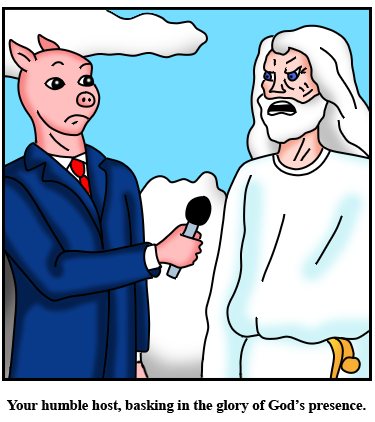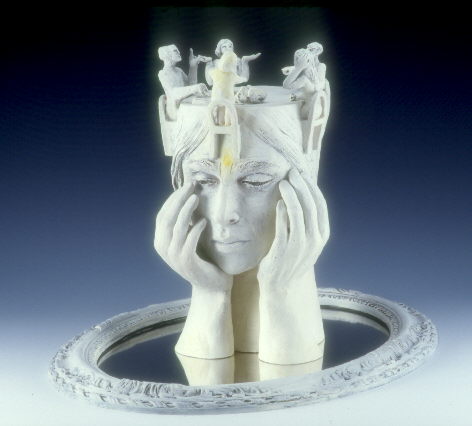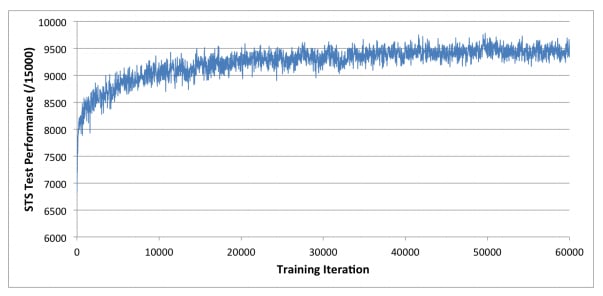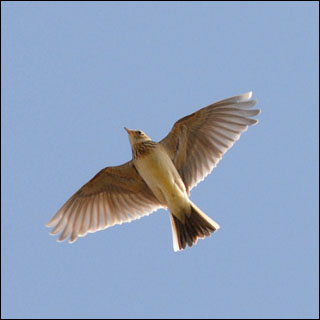

|
If we cannot love a flawed being… All honour and reverence to the divine beauty of form! Let us cultivate it to the utmost in men, women, and children—in our gardens and in our houses. But let us love that other beauty too, which lies in no secret of proportion, but in the secret of deep human sympathy. Paint us an angel, if you can, with a floating violet robe, and a face paled by the celestial light; paint us yet oftener a Madonna, turning her mild face upward and opening her arms to welcome the divine glory; but do not impose on us any aesthetic rules which shall banish from the region of Art those old women scraping carrots with their work-worn hands, those heavy clowns taking holiday in a dingy pot-house, those rounded backs and stupid weather-beaten faces that have bent over the spade and done the rough work of the world—those homes with their tin pans, their brown pitchers, their rough curs, and their clusters of onions. In this world there are so many of these common coarse people, who have no picturesque sentimental wretchedness! It is so needful we should remember their existence, else we may happen to leave them quite out of our religion and philosophy and frame lofty theories which only fit a world of extremes. …There are few prophets in the world; few sublimely beautiful women; few heroes. I can’t afford to give all my love and reverence to such rarities: I want a great deal of those feelings for my every-day fellow-men, especially for the few in the foreground of the great multitude, whose faces I know, whose hands I touch, for whom I have to make way with kindly courtesy. Neither are picturesque lazzaroni or romantic criminals half so frequent as your common labourer, who gets his own bread and eats it vulgarly but creditably with his own pocket-knife. It is more needful that I should have a fibre of sympathy connecting me with that vulgar citizen who weighs out my sugar in a vilely assorted cravat and waistcoat, than with the handsomest rascal in red scarf and green feathers—more needful that my heart should swell with loving admiration at some trait of gentle goodness in the faulty people who sit at the same hearth with me, or in the clergyman of my own parish, who is perhaps rather too corpulent and in other respects is not an Oberlin or a Tillotson, than at the deeds of heroes whom I shall never know except by hearsay, or at the sublimest abstract of all clerical graces that was ever conceived by an able novelist. — George Eliot |
1 September 2015
|
||
|
A physicist warns us about private control of our money supply “The whole profit of the issuance of money has provided the capital of the great banking business as it exists today…An honest money system is the only alternative.” “How can we tolerate the fact that money is both created ex nihilo and lent at compound interest, while at the same time serving as a unit of measure for wealth which is incapablze of either of those ‘conjuror’s tricks’?” — Frederick Soddy, who won the 1921 Nobel Prize in Chemistry for discovering that one element can be transformed into another, was born this day in 1877. Soddy was also prescient in warning the scientific community that atomic energy would be weaponized. |
2 September 2015
|
||
|
Composed Upon Westminster Bridge, September 3, 1802 Earth has not anything to show more fair: — William Wordsworth |
3 September 2015
|
||
|
from chaos, LIGHT Listen to the world being created, impressions of… — Darius Milhaud, born this day in 1908. |
4 September 2015
|
||
|
Longing for Belonging How do we reclaim our sense of belonging in the world when it is constantly being eroded by modern society in the form of the economy, technology, education and media? Here are some of the ways we are experiencing separation:
We live within a cultural mythology that tells us we are separate beings in competitive relation for power, even for survival. We long to return to a culture of inclusiveness, cooperation, and the sharing of gifts. — read more on HuffPo from Charles Eistenstein |
5 September 2015
|
||
|
All of my life, or at least since the end of last month, I’ve used as a working defintion of God, ‘That aspect of the world of which nothing can be known.’ It follows that all theology is…we won’t go there. But we may ask about science: Surely science expands knowledge. Science expands, so God contracts, right? Maybe not. Remember what John Wheeler said: “We live on an island surrounded by a sea of ignorance. As our island of knowledge grows, so does the shore of our ignorance.” — Josh Mitteldorf |
6 September 2015
|
||
|
A Basic Income for All The basic income has been supported by people across the political spectrum. President Nixon advocated for a version of it, as did George McGovern and President Jimmy Carter. It has been supported by libertarian economists like Milton Friedman as well as progressive economists. It is the simplest way to end poverty while at the same ending the bureaucracy that surrounds poverty programs. Its roots are in the American Revolution. In 1795, American revolutionary Thomas Paine called for a Citizen’s Dividend to all U.S. citizens “his or her natural inheritance, by the introduction of the system of landed property.” The U.S. economy, indeed much of the world economy, is in stagnation and decay because capitalism is in a crisis. Gar Alperovitz explains: “when you concentrate all the income at the top, people don’t buy. They can’t buy enough.” By creating a basic income and building wealth in communities and among workers, the economy will work for everyone. There are lots of ways to pay for a basic income… — read more from Popular Resistance |
7 September 2015
|
||
|
An Interview With God Interviewer: What surprises you most about mankind? God: "That children are in such a rush to grow up, and adults are so nostalgic about their childhoods. That they give up their health making money and then spend so much money trying to restore their health. That by thinking anxiously about the future, they forget the present, such that they live neither for the present nor the future. That they live as if they will never die, and they die as if they had never lived." — Reata Strickland video with photos and music |
8 September 2015
|
||
|
Truth I believe that truth has only one face: that of a violent contradiction. «Je crois que la vérité a seulement un visage : — George Bataille, born this day in 1897 |
10 September 2015
|
||
|
9/11 + 14 Are we yet ready to laugh at the hoax that was perpetrated on us, and the regressive gallop with which our nation and its Western allies have pursued dunderheaded, inhuman policies these last fourteen years? |
11 September 2015
|
||
|
British Labour Party Elects a Socialist British Labour Party today voted Jeremy Corbyn, an avowed socialist, for its leadership. This means that if Labour attains a majority in the next parliamentary election, Corbyn would be Prime Minister. Labour suffered a crushing defeat in the elections last May, and ever since has been looking for new leadership. Corbyn’s ascent was made possible by new party rules about how the leader is chosen. Grass roots enthusiasts dominated this election. Among Corbyn’s policy positions: He favors return to the public sector of many of the services and industries that have been privatized since Margaret Thatcher. He wants Britain to withdraw from the EU. He favors an end to austerity policies, and increase in public investment. Britain’s economic system is already substantially more socialistic than the US, but less than Germany or France, which in turn do not lean as far left as Scandinavia. — News article in The Guardian. Video interview introducing Corbyn. |
12 September 2015
|
||
|
Fairy tale A very long time ago, there was a young man named Akutagawa who wanted only to be happy. He was not wealthy, but well-read, so he knew that the way to be happy was to marry a princess. The village where he lived had but one Princess, and she was reputed to be enamored of battle heroes brave and strong. Akutagawa knew nothing of battle, so he resolved to study with Nobunaga, the Samurai who lived over the mountains and across the desert, a thousand li to the North. Traveling on foot, he scaled the craggy peaks with rope and crossed the long desert with 100 pounds of water on his back, and finally arrived at the Samurai’s doorstep. Akutagawa consented to a one-year probation period, during which he was to chop wood and carry water, while the Samurai determined whether he would be a suitable disciple. What else could Akutagawa do, since, like all of us, he wanted no more than to be happy? At the end of the year, Nobunaga accepted Akutagawa as his disciple, and the very next day Nobunaga was defeated in battle, after which he did the only honorable thing. Akutagawa had no choice but to fall back on his own resources, and as he had watched the Samurai intently for one year, he knew just what to do. For one whole year, he developed his strength by carrying stones up the mountain. Each day he would carry one extra stone, and deposit it higher up the mountain slope. For one whole year, he developed his courage by leaping from the cliff into the river gorge. Each day, he would climb higher onto the cliff and dive deeper into the water. For one whole year, he developed his skill in the art of archery. Each day, he would stand further from the target and draw his bow longer before releasing the arrow. At the end of three years, Akutagawa felt ready, and by desert road and mountan trail he return to his village. As luck would have it the local Warlord had entered into a feud with a neighboring Baron that very day, and was recruiting a volunteer army of only the most valiant knights. Akutagawa was overjoyed. He enlisted in the Warlord’s army of one hundred knights, though the Baron’s army was four hundred strong. On foot, he strode to the head of his unit to meet the Baron himself on horseback. He engaged the Baron in a contest of lance and sabre, though he had trained himself only in the art of archery. With unflinching valour, he met his inevitable defeat, and when he placed his head at the feet of the Baron to plead for mercy, the Baron agreed to spare his life on condition that he win for him the hand of the Princess in marriage; for it was for the sake of her love that this clash of five hundred knights was being waged. Akutagawa took on himself the mission of pleading the Baron’s suit before the Princess. Returning to the Warlord’s castle, he loosed an arrow from his mighty bow and reached the high window behind which was the chamber of the Princess. When the Princess appeared at the window, he braved the castle moat and deftly scaled the high wall to address her. Would she agree to be the Baron’s bride, and avert the humiliation and massacre of her father’s hundred knights? The Princess replied that she had always loved the Baron, though her father had frowned upon the match. Akutagawa bade her fetch a rope and hold fast to his back, while he descended the castle wall, returned behind enemy lines, and delivered the Princess to her suitor, fulfilling his mission. Akutagawa returned home at last, defeated, exhausted, empty of hope, but abundantly happy. — Josh Mitteldorf |
13 September 2015
|
||
|
New beginning There is no need for you to be the person you were yesterday. You may choose who you want to be, beginning … now. There is no need for the future to be like the past. Decide if there is anything you hold so precious as to prefer it to exploration of the infinite. You may choose, first, from whom you wish to learn, whose essence you wish to imbibe, with what vast potentials you wish to meld your own dear self. — Reb Menachim Bosch |
14 September 2015
|
||
|
Everyone is a world
— Gunnar Ekelöf, born this day in 1907 |
15 September 2015
|
||
|
Learning machines It’s been almost 20 years since IBM’s Deep Blue supercomputer beat the reigning world chess champion, Gary Kasparov, for the first time under standard tournament rules. Since then, chess-playing computers have become significantly stronger, leaving the best humans little chance even against a modern chess engine running on a smartphone. But while computers have become faster, the way chess engines work has not changed. Their power relies on brute force, the process of searching through all possible future moves to find the best next one. Of course, no human can match that or come anywhere close. While Deep Blue was searching some 200 million positions per second, Kasparov was probably searching no more than five a second. And yet he played at essentially the same level. Clearly, humans have a trick up their sleeve that computers have yet to master. — Read more from MIT Tech Review Chess is a playground in which we are learning how to build learning machines. When machines can learn from experience in the real world, it will be a new day, because they learn so much faster than we do. – JJM |
16 September 2015
|
||
|
Dawn Ecstatic bird songs pound — William Carlos Williams, born this day in 1883 |
17 September 2015
|
||
|
Off the mat and into the world How do we align the outer world and the inner world in all aspects of our lives? The practice of yoga prepares, then propels us out into the world, then infuses everything that we do… |
18 September 2015
|
||
|
Strange bedfellows This is a story about viruses that became domesticated by parasitic wasps, which use them as biological weapons for corrupting the bodies of caterpillars, which in turn can steal the viral genes and incorporate them into their own genomes, where they protect the caterpillars from yet more viruses. Evolution, you have outdone yourself with this one. — Atlantic article by Ed Young Aside from being an intricate tale of spy-vs-spy in its own right, this story stands as an example of the way evolution is far more complicated than the picture of "blind mutations and selection for those that reproduce fastest" which is the standard paradigm. “Mutations” must be expanded to include many kinds of DNA transfer not from the individual’s parents. And “selection” must include robust alliances and communities, commensals, and entire ecosystems that become co-evolved for robust survival. |
19 September 2015
|
||
|
Here I find myself, surrounded by familiarity, seeking bewilderment. — Josh Mitteldorf |
20 September 2015
|
||
|
The Leap Manifesto We could live in a country powered entirely by renewable energy, woven together by accessible public transit, in which the opportunities of this transition are designed to eliminate racial and gender inequality. Caring for one another and caring for the planet could be the economy’s fastest growing sectors. Many more people could have higher-wage jobs with fewer work hours, leaving us ample time to enjoy our loved ones and flourish in our communities. — read an article by Naomi Klein and friends Today is International Peace Day. |
21 September 2015
|
||
|
Ode to Autumn Season of mists and mellow fruitfulness, — John Keats |
22 September 2015
|
||
|
Day of At-one-ment .שמע אלהים, העולם ברוךינו, העולם אחד .שמע אלהים, העולם ברוךינו, העולם ועד .שמע אלהים, הועד ברוךינו, הועד אחד Hear, O Gods, the World of our Blessings, the World is One. — Reb Menachim Bosch |
23 September 2015
|
||
|
A physicist pursues psychic research Russell Targ was a PhD physicist with a specialty in quantum optics, a pioneer in developing lasers at a time when lasers cost thousands of dollars and were delicate lab instruments that required fine-tuning to work at all. Then he discovered something more interesting, and switched careers. For 20 years, Targ organized a program at Stanford Research Institute, validating the uncanny success of remote viewing. Practitioners would quiet their minds, focus on a remote location (sometimes halfway around the world), and draw a picture of what they saw there. Some people had innate powers to do this with accuracy. Eventually, Targ developed a training program with which he says most anybody can learn to see what is not in front of them—sometimes. All this was funded generously by the CIA. |
24 September 2015
|
||
|
Extreme altruism? or Extreme left-brain logic? Excerpted from a forthcoming book by Larissa MacFarquhar, this article in The Guardian caricatures the life and thinking of a person who adopts conventional morality but an extreme adherence to logic That night they lay in bed and talked about money. Jeff told Julia that, inspired by her example, he was thinking of giving some percentage of his salary to charity. And Julia realised that, if Jeff was going to start giving away his earnings, then, by asking him to buy her the apple, she had spent money that might have been given. With her selfish, ridiculous desire for a candy apple, she might have deprived a family of an anti-malarial bed net or deworming medicine that might have saved the life of one of its children. The more she thought about this, the more horrific and unbearable it seemed to her, and she started to cry. I found the subject worthy of thought and attention. I found myself thinking of reasons to dismiss Julia’s logic, and reasons to believe that my own life choices were better than Julia’s. I realized both the absurdity of this lione of reasoning, and the absurdity of chastising myself for indulging in it. I was led deeper into the absurdity of moral computation. What stayed with me was how little, after all, we know about the ultimate consequences of our actions. |
25 September 2015
|
||
|
Such is Life The two greatest supra-physical pleasures of life are antithetical in operation. One is to have something to do, and know that you are doing it deftly and honestly. The other is to have nothing to do, and to know that you are carrying out your blank programme like a good and faithful menial. — Joseph Furphy, born this day in 1885 |
26 September 2015
|
||
|
The Easiest One to Fool The great and ancient creeds all have their laws— — Josh Mitteldorf |
27 September 2015
|
||
|
What is Art? …that human activity which consists in one person’s consciously conveying to others, by certain external signs, the feelings he or she has experienced, and in others being infected by those feelings and also experiencing them. — Leo Tolstoy Who can argue with that? |
28 September 2015
|
||
|
Demasiada cordura puede ser la peor de la locura, ver la vida como es y no como debería de ser. Too much sanity may be madness and the maddest of all, to see life as it is and not as it should be. — Miguel de Cervantes, born this day in 1547 |
29 September 2015
|
||
|
Sweden is adopting a 6-hr work day Sweden is moving towards a standard 6-hour work day, with businesses across the country having already implemented the change, and a retirement home embarking on a year-long experiment to compare the costs and benefits of a shorter working day. To cope with the significant cut in working hours, staff are asked to stay off social media and other distractions while at work and meetings are kept to a minimum. “My impression now is that it is easier to focus more intensely on the work that needs to be done and you have the stamina to do it and still have energy left when leaving the office,” Toyota service centres in Gothenburg, which switched to a six-hour day 13 years ago and report happier staff, a lower turnover rate, and ease in enticing new employees to come on board. Competition for scarce jobs is an absurdity of modern economics. There is no scarcity of goods and services, just a frightened work force deprived of the opportunity to partake in the economy. The solution is obvious.—JJM |
30 September 2015
|
||




























